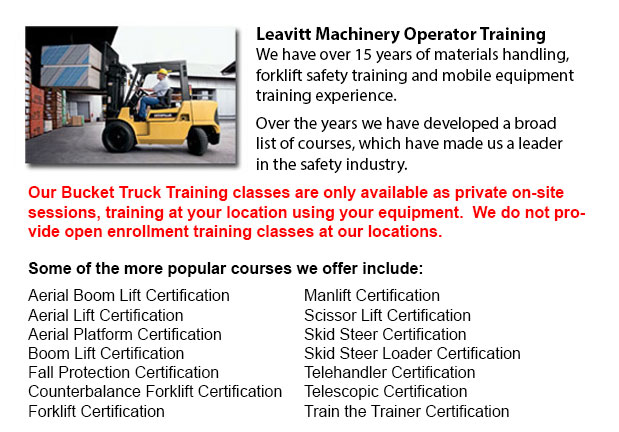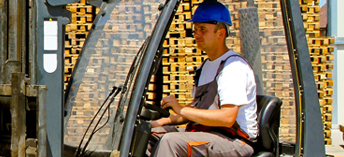
Bucket Truck Training Burlington - The Vehicle-Mounted Aerial Work Platform or also called bucket truck training program is intended to decrease the risk of incident and personal injury while working in close proximity or with bucket trucks by efficiently training operators who are qualified. An aerial lift device is whichever vehicle-mounted device, articulating or telescoping, or both, which is utilized to position workers to reach spots which will otherwise be unreachable. Aerial lift devices are used in order to elevate employees to above-ground work sites.
The objective of the program is to provide operators with the skills, knowledge, training materials and abilities necessary to be able to learn to operate vehicle-mounted aerial work platforms safely and effectively.
The program includes a classroom training session and a hands-on training session. To become certified, participants have to be successful in both components. A full-size certificate and a wallet-size certificate would be issued upon finishing the program.
The types of lifts examined in the program comprise Aerial lift devices are often constructed with metal, wood, reinforced plastic, fiberglass or other materials.
Definitions
Articulating boom platform: has two or more hinged boom components.
Extensible boom platform: has either an extensible boom or a telescopic boom.
Platform: the part of an aerial device that is designed to carry employees.
Mobile unit: any aerial device along with its parts like for example vehicle and related machinery.
Employers have the responsibility to make certain their employee acquire right training before operating aerial devices. Workers should make sure they likewise receive the needed training and that they do not operate lift devices if they are not authorized to do so. Workers should make sure that they have on the right protective equipment when working from the platform.
Course content includes operating the vehicle-mounted aerial work platform, safe operating practices, pre-shift inspections, use of emergency controls, lifting capacity, and administering theory and practical tests. Operators will know rules under the federal and local regulations.
-
Order Picker Training Burlington
Order Picker Training Burlington - Order picker's enables warehouse employees to lift pallets using forks. Also called a stock picker, this particular electrically-powered equipment is similar to a forklift except that an order picker is likewise uti... More -
Crane Certification Burlington
Crane Certification Burlington - The Crane Certification training program includes content recommended by industry regarding the efficient and safe operation of cranes. Trainees would learn the following: how to identify cranes and their component pa... More -
Overhead Crane Training Burlington
Overhead Crane Training Burlington - The overhead crane is a piece of equipment which can lift and move huge, heavy objects which can't be handled by hands. Typically, overhead cranes are fixed in place. These equipment are capable of moving huge vol... More -
Aerial Lift / Boom Lift / Man Lift / Scissor Lift Training in Burlington
Lift tables or scissor lifts could elevate both people and goods vertically. They are normally used in construction, commercial and industrial environments. Commonly, the use of a scissor lift is to lift and lower supplies from one floor of a job loc... More -
Telehandler Operator Training Burlington
Telehandler Operator Training Burlington - Telescopic Handler forklifts or telehandler forklifts are usually found on construction places and their popularity continues to rise. The versatility of telehandler forklifts ensures that they are a valuabl... More -
Forklift Training Classes Burlington
Forklift Training Classes Burlington - Forklift are heavy pieces of industrial machines that are made use of in transporting and the handling of merchandise and materials. They are often known as Lift trucks and are found in all sorts of businesses.... More -
Boom Lift Training Burlington
Boom Lift Training Burlington - Aerial platforms or also known as elevated work platforms are devices that allow workers to perform tasks and duties at elevated heights that would not be otherwise accessible. There are a variety of aerial lifts avail... More -
Skid Steer Loader Training in Burlington
A skid-steer loader is an engine powered equipment that has a small and rigid frame. It is outfitted together with lift arms which are used to attach to different labor saving attachments and tools. Typically, skid-steer loaders are four-wheel drive... More

Forklift Training Burlington
TOLL FREE: 1-888-254-6157
Burlington, Ontario
forklifttrainingburlington.com
Email Us
About Us


